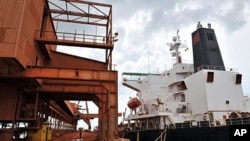The world's top bauxite producer, Guinea, recently signed its first mining agreement since the country's return to democracy, which analysts say may expedite the development of its lucrative mining sector.
Australian mining giant Rio Tinto has agreed to pay Guinea $700 million for the right to mine iron ore in two blocks of the country's southern Simandou mountains.
As part of the deal, a new rail line and port will be built to transport ore from the mines once it starts producing by around 2015.
New prospects
Guinea's budget minister, Mohamed Diare, hailed the agreement as a sign that Guinea's fortunes could be turning.
Diare said it opens horizons for negotiations with other miners, which will enable the country to tackle the enormous and legitimate needs of its people, while also galvanizing development in other sectors of the economy.
The minister added that Guinea wants to move faster to finalize its mining code to ensure that other companies already operating in the region are complying with the new rules.
Rio Tinto once controlled the whole Simandou block but was stripped of its northern half in 2008. After months of uncertainty over whether it would lose the other half, the new deal allows it to continue operating and opens the way for billions more in investment.
Democracy to help business, development
Guinea is emerging from a long period of unrest after a bloodless coup in 2008 brought about two years of chaotic military rule. The country successfully held elections at the end of December, re-establishing democratic rule.
The new government, led by President Alpha Conde, has accused the former military junta of pilfering state coffers and has promised to bring more prosperity to its mostly impoverished population.
Guinea now wants to capitalize on its bountiful resources, especially mining, which accounts for 70 percent of the country's exports.
Analysts agree that this deal could be a sign of real change.
Guinean economist Mohamed Kourouma says it will reassure investors in the mining sector and boost the country's image as one where real contracts can be signed without bribery or corruption.
Some remain cautious
However, some warn that it's too soon to tell if this will bring broader reform. Guinean journalist Aboubabcar Diallo is one critic of the agreement.
He says the agreement introduces the possibility that all of Guinea's resources could be auctioned off to the highest bidder, opening the country to a bidding war.
Africa director for the Eurasia Group, Philippe de Pontet, says there is reason to be cautious but that overall this is a positive step.
“The government is clearly not going down the path of expropriation or rank resource nationalism, but is looking for a win-win on the country's tremendous iron-ore, bauxite and gold reserves' potential,” he said.
De Pontet says if investors see other re-negotiations go smoothly, this is a good way for Guinea to leverage its mining assets to rebuild its infrastructure, including rail, ports and roads.
Analysts: Guinea Mining Deal Could Open Doors for More Investment




